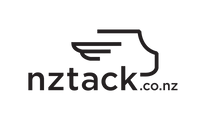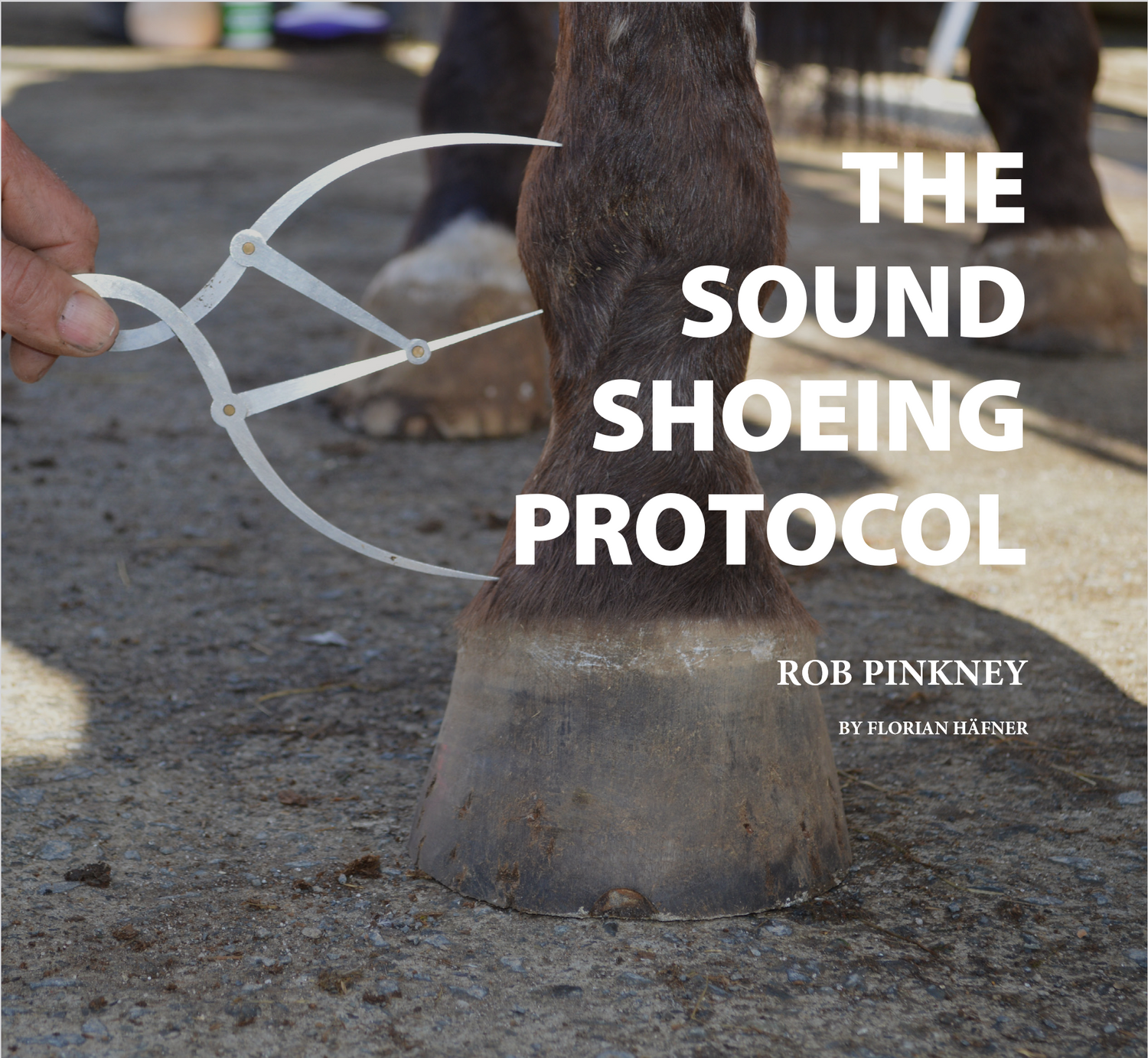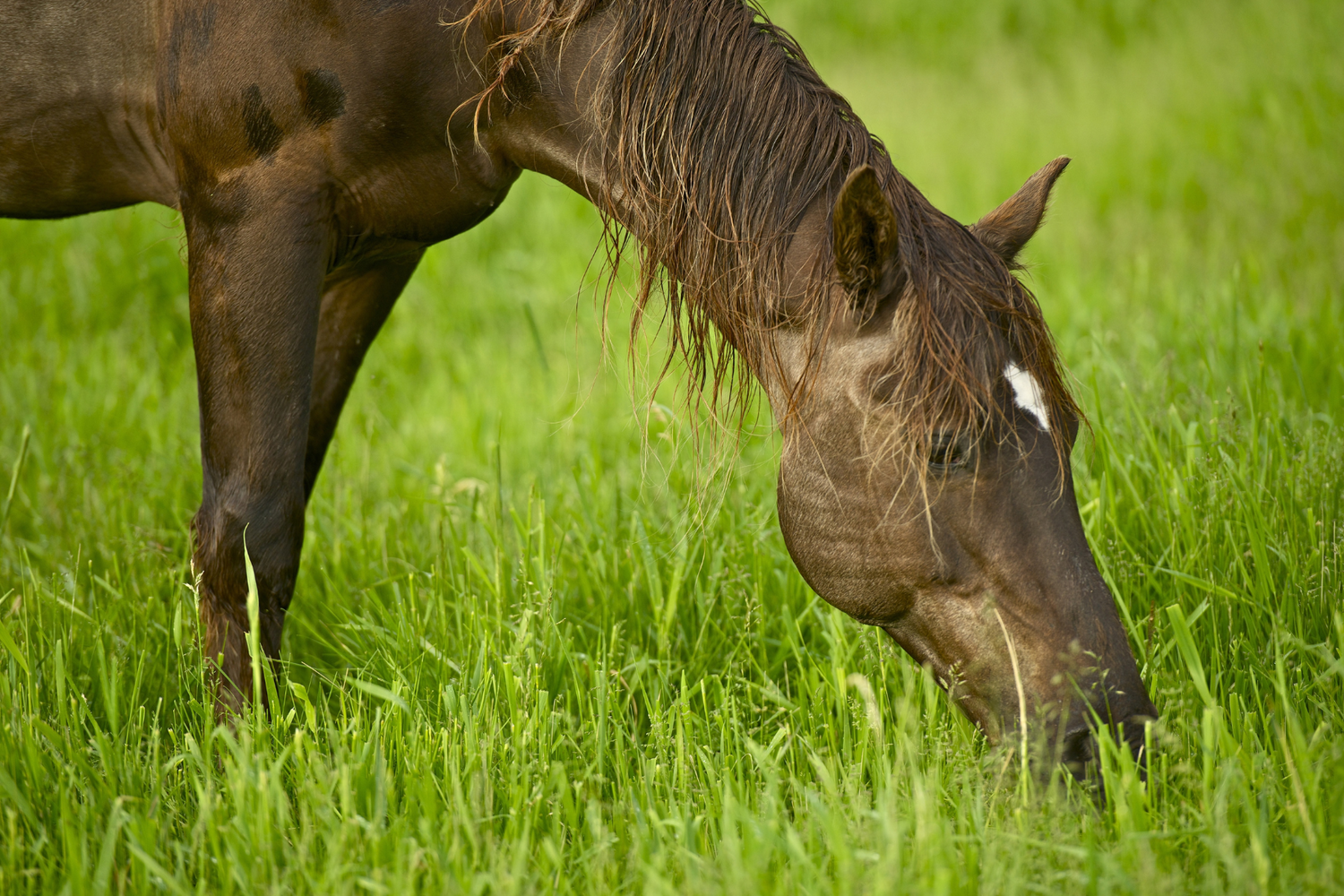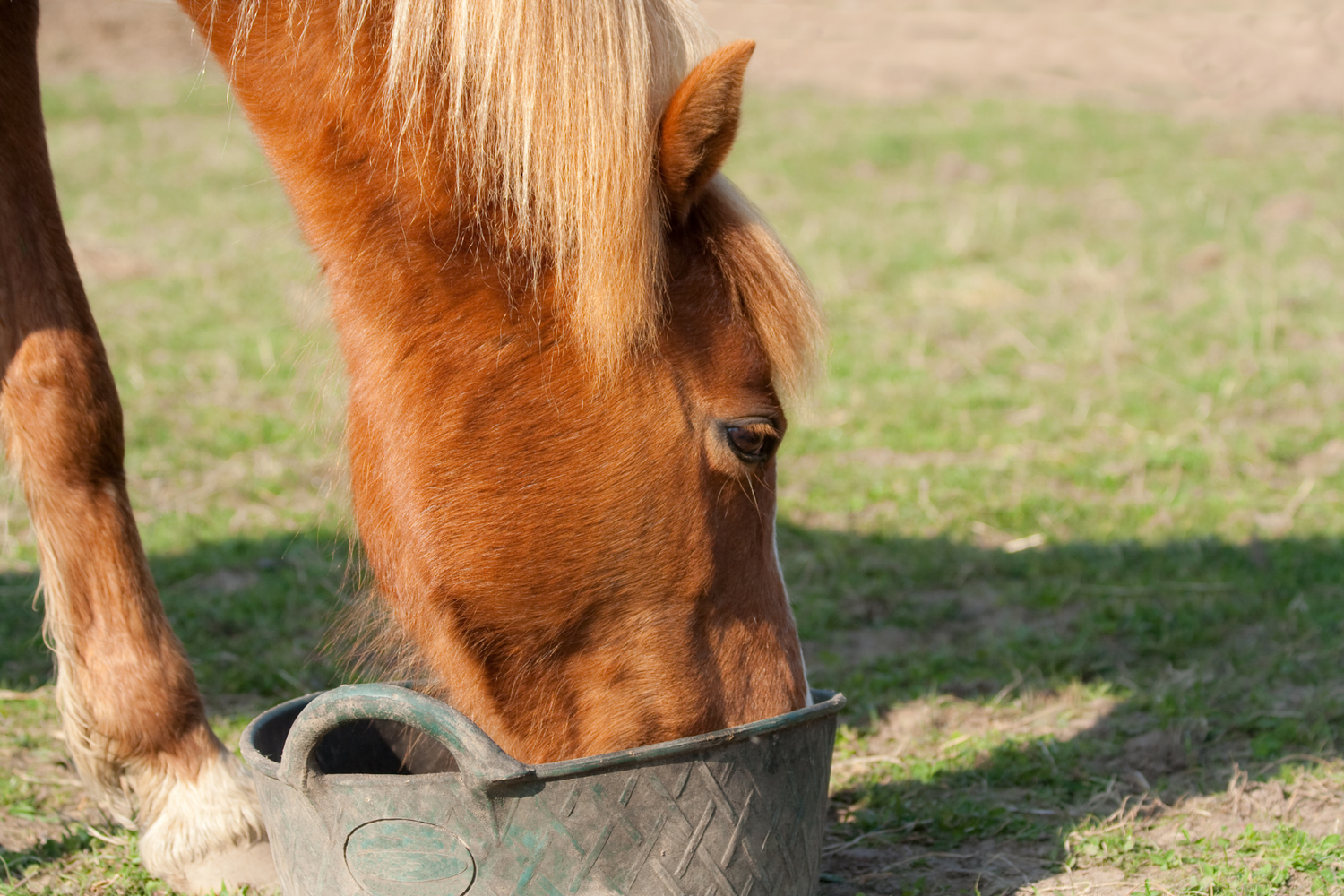When your horse is thin there is more to think about than just increasing the feed. First of all it is so important to try and analyse why condition of the horse is too light and therefore if any one or more of the following aspects are an influence then fix those first before increasing its feed intake to put on weight as this may result in an over- energised or fizzy horse who is still underweight.
1. Teeth
A horse’s teeth will need regular inspection and poor processing of feed may just be simply from sharp edges or a more complex dental issue. Either way get a vet or qualified equine dentist to examine and adjust as necessary.
2. Parasites
Check the records of the horse particularly if you have just purchased it, and see if a good worming programme has been maintained. Get a worm count done by your veterinarian and discuss the best options for the parasites found. Once you have de- wormed, keep records so that a proper programme is carried out, changing wormer types as appropriate.
3. Sickness
Know the signs of health, any illness will debilitate a horse. If he just seems off colour then get a blood test and discuss any findings with your veterinarian.
4. Stress
Signs of stress are obvious but sadly often put down to the horse “being difficult” or being naughty. Horses are reactive not proactive by nature. They respond to stimuli and environment and handling etc, and don’t deliberately set out to give an owner a hard time. (Unless they have been abused and have become defensive as a result). So look for a reason that may create stress, it may be environment, even being bullied in the paddock, fear – maybe of traveling, it may be lack of knowledge so a professional trainer can help, it may be a low level of some significant minerals and or vitamins, such as thiamine, tryptophan, magnesium so supplement with a balanced mix that provides the normal daily amount. Don’t overdo the supplements – they are not sedatives. In fact any form of sedation is not the answer – look to the cause.
5. Pain
A horse in pain will lose condition. A prolonged painful episode will reflect in the weight of the horse, even low grade pain that is not being diagnosed and as such may be a hidden cause. Again use a professional to assist with looking at possible causes, it may not be as simple as a lameness.
6. Digestive Problems
This can be a physical issue with the function of the transit of food like swallowing difficulties, or gastric ulcers, or imbalances in the digestive enzymes, intake of toxins like mould on hay and grains, loss of the microflora (good bacteria) that assist digestion within the gut.
Gastric ulcers are not easy to diagnose and require a medication with omeprazole as its active ingredient. They can be avoided by making sure the horse has sufficient fibre (grass, hay, chaff) with access to that type of feedstuff through 24 hours. It is important that a horse’s stomach has some foodstuff passing through it almost continuously, fibre is the horse’s natural food and because passes slowly through the gut – it provides protection from the continual acid flow in the stomach. Long periods without food will contribute to the onset of a gastric ulcer.
Diarrhoea is a symptom of the loss of the natural microflora, that results in poor processing of all feed in the gut. Providing a probiotic and prebiotic has been scientifically shown to assist re-establishment of the microbiome (gut flora) and so the feed intake is not wasted but processed to improve the physiology of the horse and therefore weight gain. For more help with this read about Vetpro Gut-Biotic.
It is possible to assist the digestive process of the gut by giving a product that offers digestive enzymes to process feed more efficiently early in the gut. Partially digested feed going to the hind gut causes many problems in the horse, also useful is an ingredient to slow down the speed of the feed passing though, a silicated oxide toxin binder helps in case any moulds have been ingested, a probiotic to remove any negative emissions from hindgut fermentation. Vetpro Digest Rite can provide all these ingredients in one daily scoop.
7. Age
The older horse will find it harder to keep weight on primarily due to the ageing process itself that creates difficulty in processing all the protein that they are eating, their teeth make it difficult to masticate the long fibre, and overall their internal digestive process is less efficient. To assist the uptake of all digestible protein it is necessary to supplement with Lysine and Threonine – two “limiting amino acid” these are the most important in the protein structure and the horse’s natural levels drop with age – so supplementing creates an improvement in the uptake of protein and hence body structure (often seen as top-line). Read our article ‘The Older Horse’ . Increasing protein percentage in the feed is very unhealthy for the horse and economically wasteful. Also feeding a digestive enhancing supplement like Digest Rite in conjunction with short fibre, fat meal such as copra or soybean meal plus boiled grain will be best for the older horse. There are extra care requirements for the older horse. For more on Protein read our article ‘Protein – What, Why, How Much?’.
8. Not Enough Food
This is the most obvious reason for light condition, but most horses will maintain a reasonable weight on average pasture so it is important to check out the above 7 points first before loading up a high calorie diet.
a). What are you feeding now – one very important criteria is to know what you actually feed – by weight. A scoop of this or that is irrelevant when looking at the intake of a horse versus the energy used. All information on diets and feeding is based on weight, different foodstuffs have different densities – a scoop of Lucerne chaff is a totally different weight to a scoop of oats or pellet feed.
b). A very important criteria – is to have a correct BALANCE in the types of foodstuff – that is fat, fibre, protein and carbohydrates. Just feeding a thin horse a lot of fat will not give the desired result of a healthy well looking animal with good energy. To increase weight it will be necessary to increase the volume of feed but do that in balance, increasing volume means that it will need breaking down into at least two but often three feeds. A horse should not be expected to digest more than 2Kg (or 2.5 Kg for a large animal) of hard feed – plus fibre, at any one time.
c). Know your pasture quality – Ideally good pasture, quality balance of grasses such as rye, clover, timothy, fescue, and chicory etc. combined with a balanced feed will, given time, produce the weight gain in an otherwise healthy horse. Poor pasture such as kikuyu, paspalum, high white clover, will not suffice and good quality hay from another area will be needed. Lucerne hay is a good source of protein and fibre but then don’t feed Lucerne chaff with the hard feed as well, use oat chaff. Too much Lucerne will be too high a protein percentage.
d). Horses do well on fat – it is easily assimilated by the horse and creates low energy so is not going to create any volatile reactions. Oil is a good source of fat but the daily amount has to be limited to a max of 200 ml too much will result in loose slimy manure. The best way to feed fat is by a meal such as copra or soyabean or stabilised rice bran. Some carbohydrates (grains) are necessary, aside from the all-important balance in the diet, they are needed as part of the process of digesting fat.
e). So how much to feed: a normal horse will need to eat 2-2.5% of its bodyweight in feed each day. At least half of that should be in grass or hay. So an average 500kg (16hh good condition) horse will need to eat about 10 Kg per day to maintain condition, that’s the baseline without allowing for hard work or light condition. Underdone horses or those expected to perform will need closer to 12Kg – 15Kg a day. Horses will usually eat about 8-10Kgs of pasture in a 24 hour day. (Make an adjustment in that assessment if your horse happens to be stressed in the paddock, e.g. fence walking, or the pasture is not good quality). Therefore normally a total feed for the horses either growing, needing to gain weight or in more serious work needs to be pasture plus concentrated (hard) feed.
The decision of how much additional concentrated feed must be based on the quality of the pasture, as well as the energy demands of their life, the nature of the horse (i.e. nervy or placid) and conditions e.g. climate, the condition of the horse. Even a horse doing nothing, will need more feed if it is stabled or penned overnight. A thin horse will need building up slowly with additional feed until it reaches a more optimal weight.
Use the amounts as a guide, if your horse is only 15hh then reduce the figure proportionally, a pony around 14hh in normal condition would be approximately half the amount and so a small hack would be about three quarters, but again look at and know your horse, it is not a precise figure, some horses are better doers and so should be fed less. Therefore a horse in light condition allowed 24 hour access to average pasture and/or hay will need two additional feeds a day providing an additional 4-5Kgs, and made up of fibre, fat, protein and carbohydrates. Each feed can be for example:
1 Kg of fibre such as chaff (Lucerne or oat chaff) or fibre-mix, 1 Kg of fat meal (soybean, copra, rice bran), 500gms grain suggested processed (boiled or micronized or extruded) barley. Supplement with a good full formula mineral mix and electrolytes. Oil can be added as part of the fat but keep to a maximum of 200 ml a day and make sure it has been stored in a cool place for no longer than 30 days or it may be rancid. If a premix feed is preferred the read the label! Check out the balance that it provides and make sure you feed the recommended amount by weight, just giving a small amount (because it is expensive) will still be underdoing the horse and a gain in condition will not result.
A useful addition is a supplement of stabilised rice bran, for example Vetpro Muscle-Max is just that, also with chromium, and also provides very high level of antioxidants, omega 3, 6 and 9, natural Vitamin E and B Vitamins, plus gamma oryzanol – a plant sterol. As a supplement it adds to the weight gain and assists the energy transfer within the cells so releasing the energy from feed to be stored and improve condition. It has the added advantage that as a supplement it doesn’t increase the feed size so the maximum of 2 Kgs of hard feed is not reduced.
Summary
So to improve condition of your thin horse check out the points 1 – 7 first to find the reason for light condition. Then feed a full and balanced and supplemented feed at least once but often twice a day. Be patient – weight gain is a slow process and will take several weeks depending on the original condition of the horse.
When in doubt seek professional advice.
This article is courtesy of Vetpro NZ





